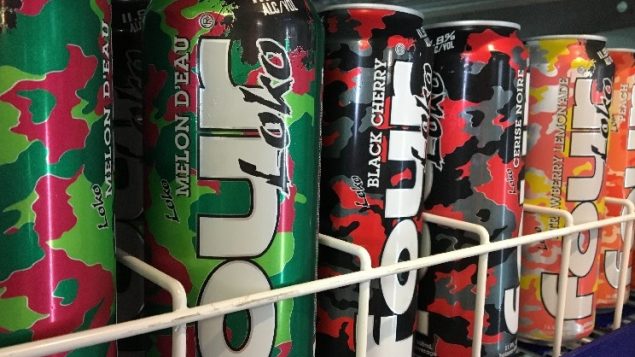(public comments open on all RCI stories – scroll to bottom to submit. Comments will be posted after moderation)
A brand of high-alcohol sugary drink is being cited as a contributing factor in the death of a 30-year-old Quebec.
Pierre Parent of Drummondville had allegedly become addicted to Four Loko, a sugary drink which has an alcohol content of 11.9 per cent.
He died last December 26, and the coroner’s report released this week says it was from cardiac arrest due to a mix of caffeine, alcohol, and an antihistamine found in some medicines to treat the symptoms of a cold.

Pierre Parent was apparently addicted to the high-sugar, high alcohol drinks (courtesy Audrey Provencher)
On the evening before a Christmas dinner gathering, Parent drank two tins of the drink (586-ml each), a vodka “cooler”, and later that night, two more tins of Four Loko, before taking two Tylenol cold medicine tablets.
The next morning his girlfriend found him comatose in their bed, and he was rushed to hospital where he later died.

Pierre Parent’s girlfriend, Audrey Provencher, now calls these sugary alcohol drinks “poison in a can”. (Radio-Canada)
The coroner later found that he had a weakened heart and damaged liver consistent with high alcohol consumption.
Parent apparently drank at least two tins of the sugary high-alcohol drink per day. His girlfriend said he felt he was young and invincible and there was no harm in the consumption of these drinks.
- RCI: Mar 2018 Sugary Alcoholic drink: teen death
- RCI: Oct 2017: new beverage worries medical officials
Medical officials have been warning about the dangerous effects of combining, alcohol, caffeine and medicine and Quebec coroner Yvon Garneau said government health departments should be raising awareness of the dangers of these combinations.

Coroner Yvon Garneau is calling on health agencies to do more to alert the public of the dangers of mixing drugs, caffeine, and these high sugar high alcohol drinks (Radio-Canada)
There have been a number of deaths associated with these types of sugary alcoholic drinks across North America.
In a March statement following the death of a teenage girl who had consumed sugar alcohol drinks, Health Canada released a statement which read in part
The Government of Canada is concerned about the health risks of single-serve highly sweetened alcoholic beverages whose alcohol content is between 7% and 12%. These beverages, which are sold in large-volume, non-resealable containers, have colourful packaging, are inexpensive and are aggressively marketed in a manner that appeals to youth. The Government of Canada is taking action to reduce the risk that these products can pose to Canadians.

Health officials are also concerned that these high alcohol drinks are cheap compared to other alcoholic drinks, and the high sugar content helps to speed the effect of the alcohol, making them attractive to young people. (Radio-Canada)
Following the release of the Quebec coroner’s report into the death of Pierre Parent, Health Canada released the following statement to media outlets including RCI.
Health Canada has reviewed the report and will take its findings into consideration.
The Government of Canada recognizes that problematic alcohol use can have significant and widespread health, social and economic consequences for individuals and communities across Canada. We are committed to reducing alcohol-related harms. Most recently, this includes the support of Canada’s Low-Risk Alcohol Drinking Guidelines, the introduction of the Canadian Drugs and Substances Strategy (CDSS), issuing advice on Safe Levels of Alcohol Consumption, and publishing a series of social media posts on how to reduce the risk related to problematic alcohol use.
In Canada, added caffeine is not permitted in alcoholic beverages. Caffeine is regulated as a food additive and can be added only to certain products, such as energy drinks (200-400 parts per million, or ppm), carbonated cola (up to 200 ppm), and non-cola carbonated beverages (up to 150 ppm). There are some beverages, including certain alcoholic beverages, available in Canada that contain a natural source of caffeine, such as guarana seed extract, yerba mate extract, and coffee extract. These ingredients are often added as flavourings, not as stimulants. Flavouring agents, including those that naturally contain caffeine, must be declared on the list of ingredients. The amount of caffeine added by flavouring agents is generally very small.
The Government of Canada is committed to addressing the health and safety risks of large-volume single-serve highly sweetened alcoholic beverages in the short term, and also to tackling the broader alcohol-related risks and harms through a long-term, comprehensive, evidence-based approach.







For reasons beyond our control, and for an undetermined period of time, our comment section is now closed. However, our social networks remain open to your contributions.